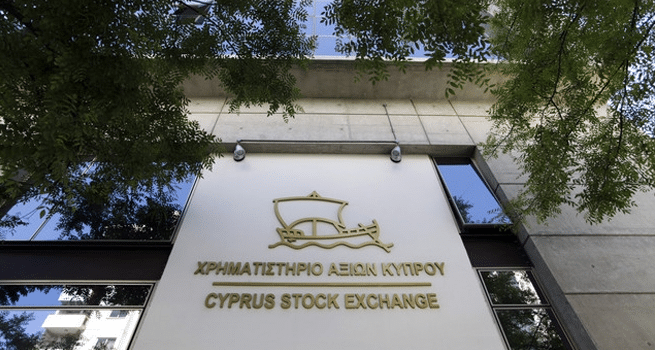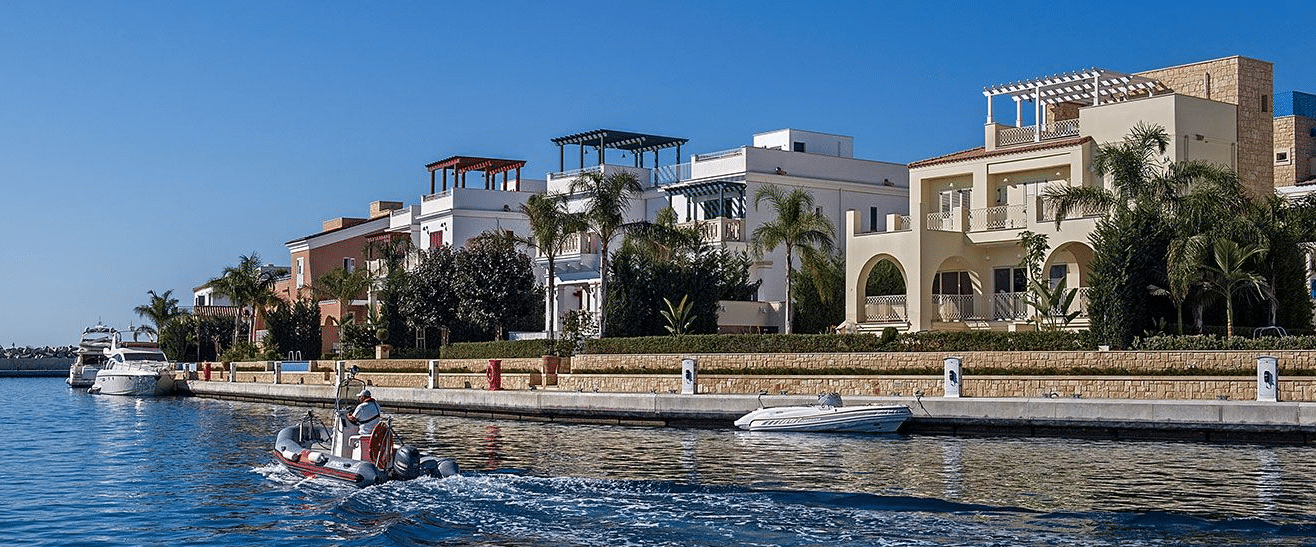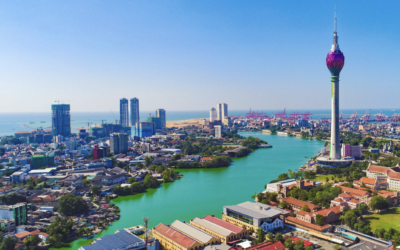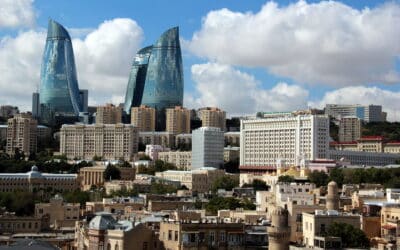By investing in Cyprus, you’ll gain access to the crossroads of Asia, Europe, and Africa.
Technically part of the Asian continent, but also an EU member, Cyprus spot on the map is truly unique and helps it serve as a regional trade hub.
Combined with an attractive business climate and relatively skilled labor market, Cyprus’ geographic advantage makes it an ideal gateway for foreign capital.
Our guide about investing in Cyprus covers how to buy property, the local startup scene, along with the country’s small-but-growing stock market.
We’ll start with a quick summary of the Cyprus economy before moving onto real estate and stocks though.
Cyprus: Gateway to the Mediterranean
You’ll find several compelling reasons to invest in Cyprus as a foreigner. With its highly strategic location, Cyprus grants opportunities in trade and business expansion.
These perks are further enhanced by tax breaks for foreigners and the ability to become a permanent resident of Cyprus by investment.
Property, finance, and tech all are especially booming in Cyprus, which offers a wide array of choices for investors.
The local tourism sector is likewise flourishing here. Cyprus’ lifestyle is known for creating a high standard of living while drawing in tourists/expats from around the world.
Best Places to Invest in Cyprus
Cyprus is a diverse country, and you’ll find that each city has its own blend of culture and commerce.
Nicosia is the capital and largest city of Cyprus since the 10th century. The city itself has been continuously inhabited for over 4,500 years, with a historic role since the Assyrian era.
Today, Nicosia is the political and financial center of the nation, with the coexistence of an old town as well as a vibrant modern business center.
Real estate prices in Nicosia and Limassol are the most expensive in Cyprus, yet they still aren’t prohibitively expensive compared to other countries in the EU.
The average price per square meter for housing in Cyprus’ most popular places to invest is about €3,000 which is indeed rather competitive.

Nicosia’s skyline shows just how developed Cyprus has become over the past 50 years.
Along the southern coast, Limassol is the financial capital of Cyprus and an industrial port city. One of the busiest ports in the Mediterranean, the Port of Limassol, has positioned itself as a key hub for trade and logistics.
Paphos lies on the west coast. It’s an idyllic seaside town famed for its rich archaeological heritage, including some of the finest Roman villas anywhere to be seen. It’s especially become popular with tourists, creating opportunities in hotels and real estate.
The island’s third largest city, Larnaca, lies on the southeastern shore and hosts the main international airport and Cyprus’ busiest port.
Famagusta lies in the northeastern part of Cyprus, and is locally famous for its beaches. The city became divided into two parts due to longstanding political conflict.
The northern part of Famagusta is part of Turkey, including the former thriving tourist region known as Varosha.
It’s almost needless to say that we wouldn’t suggest investing here – Varosha is far too volatile of a location to buy property or start a business.
How to Start a Company in Cyprus
An LLC in Cyprus can be wholly foreign-owned, requiring only a single director (either an individual or a company).
Shareholders of a company in Cyprus can be from any nationality and there aren’t any limits on foreign ownership percentage either.
Furthermore, there are no restrictions on most industries… with the exception of media and financial services, which are both heavily regulated.
You’ll need an active registered office address within Cyprus to which all official mail will be addressed. Many companies investing in Cyprus choose an external corporate service provider to meet this requirement.
Cyprus benefits from one of the most favorable corporate tax regimes in the European Union, with a standard corporate income tax rate of only 12.5%.
On top of that, Cyprus has a decent network of double taxation treaties with more than 60 countries.
Financial Markets and Stocks in Cyprus
The Cyprus Stock Exchange (CSE) was established back in 1996. With a market cap of only about €4 billion, Cyprus doesn’t have a large stock market by any means.
Nonetheless, the exchange has grown steadily ever since its inception. Most people also find that trading stocks in Cyprus is a user-friendly experience once they’ve already set up a local brokerage account.

The CSE currently has 108 listed companies from various sectors, which is relatively small compared to other major stock exchanges worldwide.
Getting an account in the first place is often the complicated part and often requires living here as a resident.
Fortunately, if you meet the criteria, investors don’t need to make a personal visit to open a brokerage account in Cyprus. The entire process can be done remotely, at least in some cases, and depends on who you’re banking with.
The growing capital market here includes firms that include Bank of Cyprus. Meanwhile, Eurobank is one of the largest international players in the country.
Cyprus’ Currency: The Euro
Cyprus is part of the Eurozone and uses the Euro (EUR) as its official currency. This enables businesses and investors in Cyprus to use a single currency, bringing stability and facilitating international transactions.
You’ll find an abundance of currency exchangers in all of the main tourist areas in Cyprus, including at most banks, exchange offices, and even as an ATM feature.
Since the Euro is one of the most popular world currencies, it’s easy to convert to almost all other currencies. It’s pretty stable with a minimal amount of currency exchange risk.
We realize that some investors want to diversify outside of major world currencies like the EUR and USD. That said, we think the Euro’s adoption is positive in this case.
Quite frankly, you’re far better off here than with exotic currencies in the region such as the Turkish Lira.
Industry in Cyprus
Cyprus has a dynamic economy, providing the local and international investor community with a plethora of ways to invest in the island.
Tourism is ranked one of the main drivers due to Cyprus’ impressive coastline, beaches, and historical and cultural sites.
Millions of people visit Cyprus each year. Naturally, this means hotels, restaurants, and related services must cater to this growing demand.
It’s also worth noting that Cyprus has one of the largest ship registers, and consequently, is at the heart of the global maritime industry.
Registering yachts and freighters in Cyprus is a popular choice, and brings a considerable amount of income.

The Port of Limassol is Cyprus’s largest port and maritime logistics hub. The Limassol Marina, a well-known cruise and yacht port, is also nearby.
Cyprus is also a well-established financial center with a renowned regulated banking sector and financial services industry. Banking, asset management, and innovation in fintech all offer opportunities.
The country has plans to tap its energy potential with offshore oil and gas reserves. Such assets provide such as energy exploration, and of course, renewable energy initiatives.
Cryptocurrency in Cyprus
The adoption of crypto in Cyprus is on the rise. Bitcoin, Ethereum, and other coins have become popular for transactions.
Cyprus also hosted some ICOs to raise funds for blockchain projects. Crypto traders can legally buy digital assets on local trading platforms in Cyprus. Several of these exchanges follow CySEC rules to offer protection for investors.
Early adoption of crypto legislation makes Cyprus a top location for investors eager to delve into this burgeoning field.
While the industry is still developing, it offers a strong base for a crypto business.
Apart from cryptocurrency itself, Cyprus is experimenting with use cases for blockchain usage in property, logistics, and healthcare.
Buying Real Estate in Cyprus
Cyprus’s housing market has continuously grown over the past several decades, with real estate prices surging in the 2000s.
The country’s strategic location, Mediterranean climate, and residence/citizenship by investment programs are all to thank for this.

The cost of waterfront and beachfront houses in Limassol can be anywhere from €600,000 to above €20 million.
The government has made efforts to encourage foreign investment in the real estate market, and there are few general restrictions on property ownership for non-citizens.
Foreign individuals and entities can buy property in Cyprus on a freehold basis, including land, apartments, and houses. There aren’t many limits at all on the type of property you can own.
However, non-EU citizens are subject to certain restrictions on the maximum amount of land they can own. Foreign, non-EU citizens can’t own anymore than 4014 m² of land in Cyprus. here.
Cyprus has multiple attractive regions, each with its own set of opportunities. You’ll find plenty of villas, houses, and commercial properties listed on the market.
Though real estate prices are steadily increasing with demand, Cyprus still remains more affordable than western Europe.
Real estate prices in Cyprus are unsurprisingly highest in coastal cities and popular tourist destinations. In the capital of Nicosia, the price per square meter for an apartment in the city center ranges between €2,500 to €3,500.
In coastal Limassol, prices are even higher at €3,000 to €4,000 per square meter. Larnaca is cheaper than either of them with houses costing between €1,500 and €2,500.

Cyprus’s passport ranks 14th on the Guide Passport Index. It provides visa-free access to 177 countries.
For those who want Cypriot permanent residency, the Cyprus Investment Program grants long-term residence to foreigners through real estate investment.
Getting Cyprus residence permanent residence requires spending a minimum of €300,000 on property.
Up until its suspension in 2020, Cyprus had a citizenship by investment (CBI) program for €2 million. This program doesn’t exist anymore though.
Private Equity in Cyprus
Cyprus has made significant efforts to boost its private equity and venture capital sector, with many efforts backed by the government directly.
Dozens of VC firms have set up shop in Cyprus over the past decade to provide seed and expansion capital. There’s an increasing trend of incubators/accelerators taking part in the local startup market.
The Cypriot government has created policies designed to foster innovation. Initiatives like the Cyprus Research and Innovation Foundation (RIF) grant capital to innovative projects, often without many strings attached.
Cyprus Investment Funds (CIFs), on the other hand, offers a way to invest in a collection of early-stage and growth-stage companies.
Here in Cyprus, you won’t find any shortage of startups. The country’s tech, e-commerce, and healthcare sectors are all especially popular for VC funds.
Should You Invest in Cyprus?
Cyprus’ Mediterranean setting makes it an attractive place to enter the European market while still having a foothold in Asia.
The country’s unique position sets it as a bridge between Europe, Asia, and even Africa. Meanwhile, Cyprus has a stable political and juridical framework… especially compared to most countries on the mainland towards its east.
With all of that said, Cyprus’ economy has major constraints. It’s small nation of barely over a million inhabitants.
For example, you aren’t going to become a billionaire here by selling consumer products in bulk. There just isn’t enough ability to scale.
You can generally expect similar returns to any other developed European market – which isn’t anything spectacular.
Cyprus isn’t an emerging economy anymore and you don’t have the same potential you would in Southeast Asia, for example.
Lastly, the ongoing territorial dispute with Turkey is also a concern. It’s unlikely anyone would try anything with an EU member state though. At least for now.
Cyprus is certainly worth considering for the right type of investor. It’s positioned in the right spot for tourism and trade. The crypto sector’s legality makes anything related to the blockchain promising as well.
That said, keep in mind that you’re still dealing with a small market. You’ll eventually face limits on growth because of that.
FAQs
Can Foreigners Own Property in Cyprus?
Yes, foreigners can own almost any type of real estate in Cyprus including land, houses, and commercial use property.
How Can I Trade Stocks in Cyprus?
The local stock market in Cyprus is rather small with only about 100 listed companies. For the most part, international brokers don't support trading here.
You'll therefore need to open a brokerage account in Cyprus in order to trade on the country's stock exchange directly.
What's the Cost of Real Estate in Cyprus?
Property values will depend on location, quality, and many other factors.
With that said, as a rule of thumb, you should expect to pay an average of €3,000 per square meter for an apartment in Nicosia or Limassol.
Is Cryptocurrency Legal in Cyprus?
Right now, Cyprus doesn't have any legal framework regarding cryptocurrency in place.
This essentially means that crypto isn't banned in Cyprus. You're able to freely trade bitcoin and other coins here.
Can Foreigners Own Land in Cyprus?
Yes, foreign citizens can own almost any type of property in Cyprus, including land.







